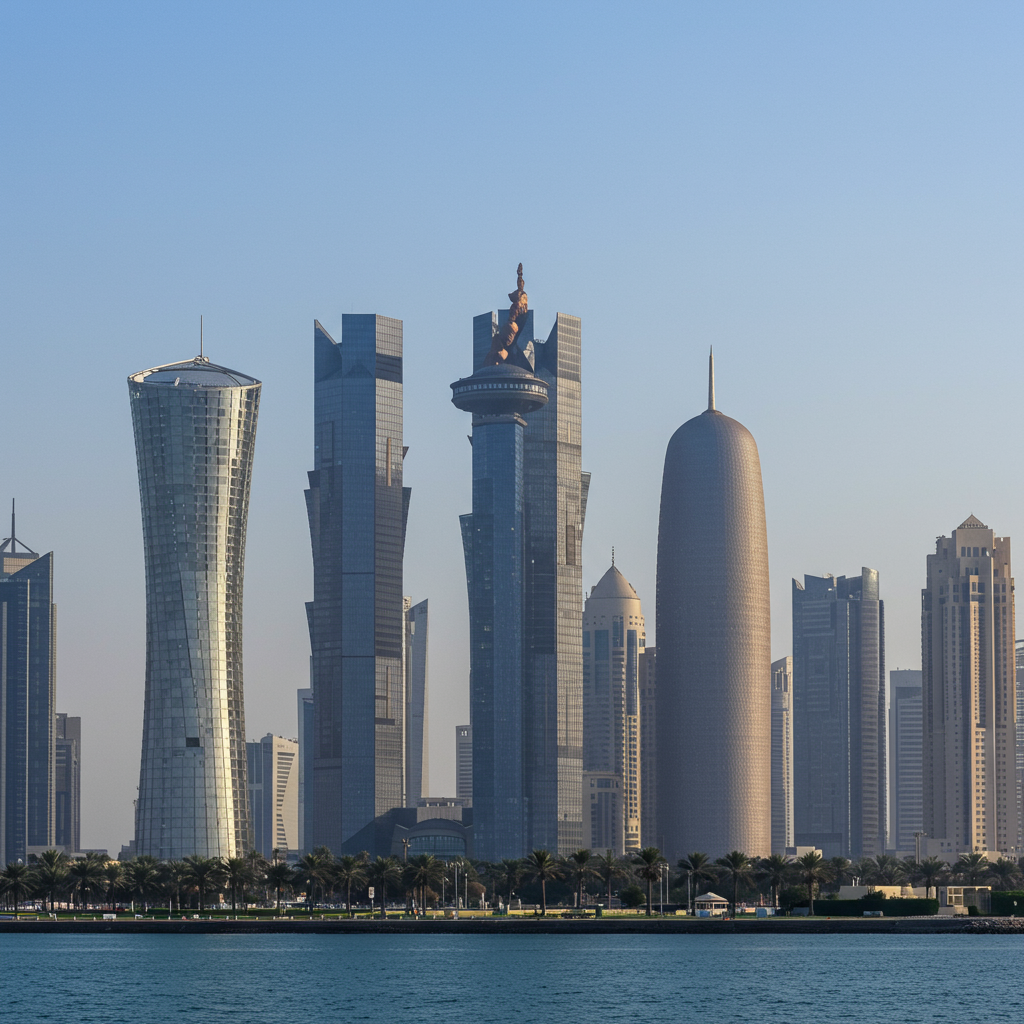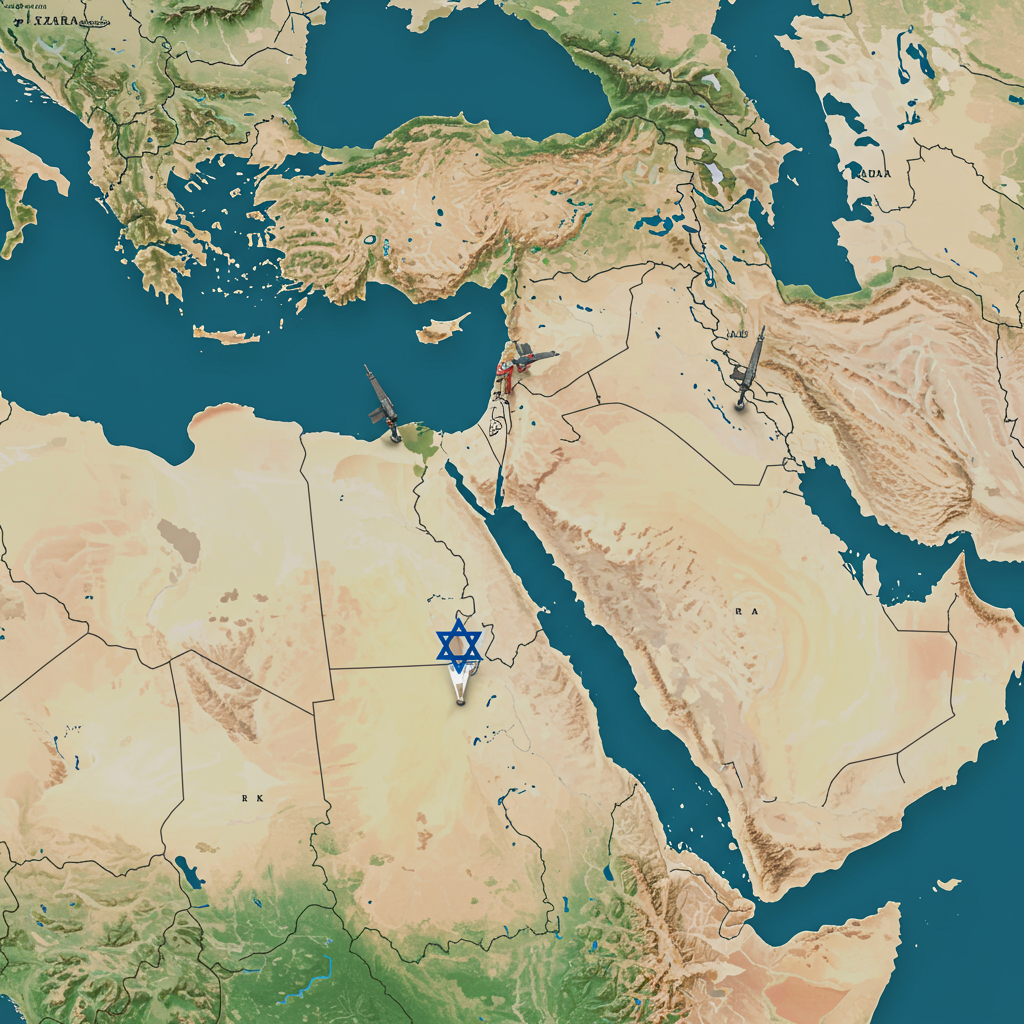An unprecedented Israeli airstrike shattered the diplomatic calm of Doha, Qatar, on September 9, 2025, targeting senior Hamas leaders. This aggressive move, carried out in the capital of a crucial mediator, immediately ignited a firestorm of international condemnation and cast a long shadow over fragile Gaza ceasefire negotiations. The incident not only escalated regional tensions but also prompted a sharp rebuke from the United States, raising serious questions about the future of Middle East diplomacy and the security calculus of Gulf states.
Israel’s Bold Strike in Doha: Targets and Casualties
The audacious September 9, 2025, operation saw Israel launch more than ten fighter jets and munitions against residential buildings in Doha. These strikes aimed at members of Hamas’s political bureau, who were reportedly meeting to discuss a US-proposed ceasefire. Israeli officials, including Prime Minister Benjamin Netanyahu, justified the action as targeting individuals responsible for the October 7, 2023, attack and for “orchestrating” the ongoing conflict. They declared an end to the perceived immunity of terror leaders.
Despite Israeli claims of a “flawless execution” and “months in the making” planning, the strike reportedly killed five Hamas members and a Qatari security official. However, it failed to assassinate the key negotiating delegation, including Hamas’s chief negotiator Khalil Al-Hayya, though his son and office director were among the fatalities. This outcome sparked mixed reactions, with Israeli Ambassador to the US, Yechiel Leiter, vowing to “get them next time” if targets were missed.
Operational Details and Unforeseen Consequences
The long-range operation required mid-air refueling for the Israeli jets, which reportedly used stealth US-made F-35I fighter jets capable of avoiding radar detection. This detail, coupled with claims that Israel used “undetectable weapons,” fueled Qatari anger. CNN executive producer Andrew Potter, residing in Doha, reported hearing “muffled explosions” rattling windows in the upscale West Bay Lagoon residential area, highlighting the proximity of the attack to civilian life. The Israeli action was seen as a direct challenge to Qatar’s sovereignty and its established role as a key diplomatic facilitator.
A Cascade of Global Condemnation
The immediate aftermath of the Doha strike saw a torrent of condemnation from across the globe, severely challenging Israel’s international standing. Qatar, the host nation, reacted with particular fury.
Qatar’s Outraged Response and Legal Action
Qatar’s Prime Minister, Sheikh Mohammed bin Abdulrahman bin Jassim Al-Thani, was visibly angry, denouncing the attack as “state terrorism” and “treacherous.” He fiercely rejected reports of prior notification from the US, stating that the call from an American official came only after explosions were heard. Al-Thani underscored that Qatari diplomacy “won’t be deterred” but acknowledged the attack had fundamentally altered the landscape of current ceasefire talks, questioning the validity of further negotiations. Qatar vowed to form a legal team to review the incident, reserving the right to respond and hold Israel accountable for breaches of international law.
US Backlash and Allegations of Complicity
The US response was complex and contradictory. While President Donald Trump initially expressed displeasure, stating he was “not thrilled about the whole situation,” the White House Press Secretary, Karoline Leavitt, publicly criticized the strike. She asserted that “unilaterally bombing inside Qatar, a sovereign nation and close ally of the United States… does not advance Israel or America’s goals.” Trump later clarified that the decision was “not made by me” and that his administration learned of it “too late to intervene,” despite claims he “immediately directed Special Envoy Steve Witkoff to inform the Qataris.” Qatari officials, however, explicitly denied receiving any such warning.
This perceived US inaction or tacit approval fueled significant criticism, with analysts like Charles W. Dunne highlighting a potential “deliberate collusion” between the US and Israel. Critics questioned why US air defenses at the massive Al Udeid Air Base in Qatar, which hosts thousands of US troops, did not protect Doha or warn its ally. This perceived complicity, particularly given Trump’s “highly personalized approach” to diplomacy, severely eroded trust in Washington among Arab governments, leading to calls for reassessment of their relations with the US.
International Outcry and Diplomatic Repercussions
The UN Secretary-General, António Guterres, unequivocally condemned the attack as a “flagrant violation of the sovereignty and territorial integrity of Qatar.” Leaders from Asia-Pacific nations, including Australia, New Zealand, Malaysia, Maldives, Indonesia, Pakistan, and Japan, universally voiced concern and condemnation, criticizing the strike for jeopardizing peace efforts and violating Qatar’s sovereignty. Canada’s Prime Minister Mark Carney described the attack as “intolerable” and a “dangerous provocation,” while European nations like France, Spain, and the UK also condemned the action. Even Saudi Arabia and the UAE, countries that have normalized ties with Israel, called it a “dangerous assault on international law” and an “irresponsible escalation.”
Gaza Ceasefire Talks in Peril
The Doha strike struck at the heart of the already fragile Gaza ceasefire negotiations, for which Qatar had served as an indispensable mediator. Qatar’s role as the primary conduit for communication between the US, Israel, and Hamas was now gravely compromised.
Mediation Efforts Derailed
Analysts, such as Hasan AlHasan of IISS, quickly warned that the attack could bring the mediation process “to a standstill.” Qatar’s Prime Minister himself implied that current talks had an “uncertain path,” stating he didn’t think “there is something valid right now after we’ve seen such an attack happening like this.” This sentiment was echoed by the Hostages and Missing Families Forum in Israel, which expressed “deep concern and heavy anxiety” that the chance of bringing captives home now faced “greater uncertainty than ever before.” The attack’s timing, precisely when Hamas leaders were reviewing a US-proposed ceasefire deal, suggested a deliberate attempt to sabotage diplomatic efforts, according to Tamara Kharroub of Arab Center Washington DC.
Israel’s Rationale and Hamas’s Resolve
Despite the international backlash, Israeli Prime Minister Netanyahu portrayed the attack as a “peacemaking action” necessary for “eliminating Hamas.” Israeli officials stated that the strike was a retaliation for recent “murderous attacks in Jerusalem and Gaza,” including a shooting at a Jerusalem bus stop that killed six. However, Hamas affirmed that the strike would not alter its demands for a ceasefire deal, which included an immediate halt to aggression, complete withdrawal of Israeli forces, a genuine prisoner exchange, and humanitarian relief for Gaza. Hamas explicitly held “the US administration jointly responsible with the occupation for this crime due to its continued support.”
Broader Regional Implications: A Fractured Landscape
The Doha strike transcended the immediate Israel-Hamas conflict, sending ripples across the wider Middle East and reshaping the dynamics of regional security and diplomacy.
Erosion of Trust and Sovereignty Concerns
The attack on Qatar, a major US non-NATO ally hosting a critical US airbase, raised profound questions about the sanctity of national sovereignty and the reliability of security guarantees. Analysts noted that Israeli jets, likely US-manufactured, operating near the largest US airbase in the Middle East, underscored the “political impotence of Arab states” and forced a reassessment of their security relationships with Washington. Kristian Coates Ulrichsen of Rice University suggested that this attack, from a close US ally, was potentially more severe than the prior Iranian strike on Al Udeid Air Base in June 2025 and could be perceived as an attack on Gulf states collectively. Iran, viewing the attack as validation of its warnings, interpreted it as a message of Israel’s intent for “future dominance.”
A “War on Diplomacy”
Many observers, including Hanna Alshaikh, argued that beyond assassinating Hamas negotiators, Israel’s “unspoken objective” was the “annihilation of diplomacy itself.” This strategy, characterized by breaking taboos and pushing boundaries, aims to make international peace efforts “exhausting and costly,” revealing Israel’s “utter contempt for international cooperation, peacemaking, and diplomacy.” This pattern extends beyond Doha, with Israel also conducting new airstrikes on Yemen against Houthi targets, further expanding its military engagements across multiple fronts.
The Debate on Palestinian State Recognition
The broader diplomatic fallout also touched upon the controversial issue of recognizing a Palestinian state. UK Prime Minister Keir Starmer’s meeting with Israeli President Isaac Herzog, shortly after the Doha strike, became a platform for Herzog to express Israel’s “firm opposition” to the UK’s plans for unilateral recognition at the UN General Assembly. He argued such a move would be “dangerous” and unhelpful, potentially empowering Hamas. US Ambassador Mike Huckabee echoed this sentiment, calling such recognition “a little stunt” that could disrupt hostage talks and encourage further Israeli actions.
The Road Ahead: Navigating a Fractured Landscape
The September 9, 2025, Doha strike marks a critical juncture in the Middle East, highlighting unprecedented challenges for peace, diplomacy, and regional stability. The immediate future of Gaza ceasefire talks remains uncertain, with Qatar re-evaluating its role as a mediator and the international community grappling with how to hold Israel accountable.
US President Trump, despite initial criticism, later directed Secretary of State Marco Rubio to finalize a Defense Cooperation Agreement with Qatar, attempting to mend fences and reaffirm the strategic alliance. However, the perceived US complicity and the attack itself have fundamentally altered trust dynamics in the region. Calls for the international community to use diplomatic and legal leverage to hold Israel accountable are growing, underscoring the deep fractures that now define the path forward in a volatile Middle East.
Frequently Asked Questions
What specific actions did Israel take in the Doha strike and why?
On September 9, 2025, Israel launched an unprecedented airstrike in Doha, Qatar, using over ten fighter jets and munitions. The targets were residential buildings housing members of Hamas’s political bureau. Israeli Prime Minister Benjamin Netanyahu and other officials justified the strike as necessary to eliminate Hamas leaders deemed responsible for the October 7, 2023, attacks and for continuing to orchestrate the ongoing conflict. The operation, reportedly “months in the making,” aimed to dismantle Hamas leadership, although it ultimately failed to assassinate key negotiators.
How has the Doha strike impacted ongoing Gaza ceasefire negotiations and regional stability?
The Doha strike severely jeopardized the fragile Gaza ceasefire negotiations, which heavily relied on Qatar’s mediation efforts. Qatar’s Prime Minister indicated that current talks were on an “uncertain path,” and many analysts predicted a standstill in the diplomatic process. The attack escalated regional tensions, as it constituted a direct violation of Qatar’s sovereignty, a crucial US ally. It also raised serious questions among Gulf states about the reliability of US security guarantees and the broader erosion of trust in international diplomatic processes, potentially leading to a reassessment of regional alliances.
What was the international community’s reaction, particularly from the US and Qatar, to Israel’s attack?
The international reaction was largely condemnatory. Qatar’s Prime Minister denounced the strike as “state terrorism” and “treacherous,” affirming legal action and rejecting any claims of prior notification. The US response was mixed; while President Trump expressed displeasure and the White House stated the strike “does not advance Israel or America’s goals,” US officials clarified they learned of the attack too late to intervene. This perceived US complicity drew sharp criticism from Arab nations, eroding trust. The UN Secretary-General, numerous Asia-Pacific and European nations, and even Gulf allies like Saudi Arabia and the UAE, all condemned the attack as a violation of sovereignty and a threat to peace.



